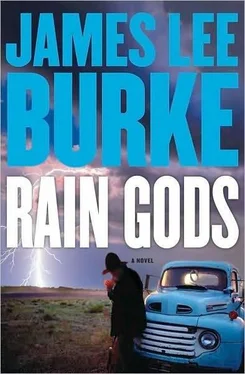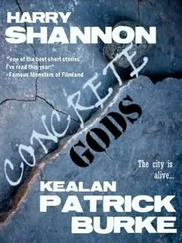“Say again?” Bobby Lee asked.
Preacher turned and reached behind the wood pallet. Unconsciously, Bobby Lee fastened the top button on his cracked sheep-lined coat as though protecting himself from a gust of cold air.
“I told you I always wanted you to be a piece of this property,” Preacher said. “That sentiment has not changed one iota.”
Down below, the Mexican killers and Esther were wakened by a burst of machine-gun fire and a tinkling of brass hulls on stone. But the sounds were absorbed so quickly inside the earth, they each wondered if they had been dreaming.
AT FIRST LIGHT Hackberry Holland and Pam Tibbs talked to an elderly man and a small boy at a dirt crossroads where they were picking up trash out of a ditch. The land was level and hard, marked by little other than fence lines and loading pens that were gray with rot and impacted with tumbleweed. Far to the east, the sun was pale and watery behind a low range of hills that looked coated with frost, ragged like glass along the crests.
“Traven?” the old man said. “No, there’s nobody here’bouts by that name.”
“How about Fred Dobbs?” Hackberry said.
“No, sir, never heard of him, either.” The old man was very large and straight in physique for his age, his hands horned with calluses, his face oblong, as big as a jug, the creases so deep there were shadows in them. He wore strap overalls and a yellow canvas coat and no cap. He studied the departmental logo on the cruiser’s door, obviously noting Hackberry was out of his jurisdiction. “It’s the frozen shits this morning, ain’t it?”
Hackberry showed him photographs of Jack Collins, Liam Eriksson, Bobby Lee Motree, and Hugo Cistranos.
“No, sir, if they live around here, I ain’t seen them. What’d these fellows do?”
“Take your choice,” Hackberry said from the passenger window. “Did you know a woman by the name of Edna Wilcox?”
“Died of an accident or a fall of some kind?”
“I think she did,” Hackberry said.
“She owned a big chunk of land about ten miles up the road and to the east. People have rented there off and on, but the house burned down. There’s some Mexicans been working there. Show your pictures to my grandson. Look right at him when you talk. He cain’t hear.”
“What’s his name?”
“Roy Rogers.”
Hackberry opened the passenger door and leaned over so he was eye level with the little boy. The boy’s hair was jet-black, his skin brown, his eyes filled with a black luminosity sometimes characteristic of people who live inside themselves.
“You know any of these men, Roy?” Hackberry said.
The boy’s eyes slid across the photographs that Ethan Riser had sent to Hackberry’s office. He remained immobile, the wind tousling his hair, his face as expressionless as clay. In the silence, he wiped at his nose with the back of his wrist. Then he glanced sideways at his grandfather.
“Want to help me out here?” Hackberry said to the grandfather.
“Not much gets by him. Roy’s a smart little boy.”
“Sir?”
“You wouldn’t tell me what these men had done, but now you want me and him to he’p you out. I suspect that seems like a one-sided deal to him.”
Hackberry got out of the vehicle and squatted down, suppressing the pain that flared in the small of his back. “These men are criminals, Roy. They’ve done some very bad things. If I can, I’m going to put them in jail. But I need people like you and your grandfather to tell me where these guys might be. If you’ve seen one of them, just point your finger.”
The boy looked at his grandfather again.
“Go ahead,” the grandfather said.
The boy touched one photograph with the end of his finger.
“Where’d you see this fellow?” Hackberry said.
“The store, last spring,” the boy said, his words like wood blocks that were rounded on the edges.
“We run a store up at the next crossroads,” the grandfather said.
Hackberry patted the boy on the shoulder and stood up. “How many houses are there on the old Wilcox property?” he said to the grandfather.
“A shack here and there, sweat lodges and tepees and such that a bunch of hippies smoke marijuana in.”
“You said there was a place that burned down.”
“That’s the place the Mexicans were cleaning up. That’s where the Wilcox woman lived. By the way, y’all are the second people to come by this morning asking about those fellows.”
“Who else was here?”
“A little round man in a Cherokee with an American flag flying on it and a young fellow and girl with him. The young fellow had a scar on his face like somebody glued a pink soda straw on it. Y’all grow them a little strange back where you come from?”
“Where’d they go?”
“Up the road. I can tell you how to get there, but the Mexicans will probably run off when they see y’all coming.”
“They’re illegals?”
“Oh, hell no.”
Hackberry got directions and got back in the cruiser. Pam dropped the transmission into gear and drove slowly up the road headed north, waiting for him to speak. A piece of the moon still hung low in the sky, like a carved piece of ice.
“The boy picked out Liam Eriksson, the only guy we know for sure is dead,” he said.
“You want to talk to the Mexicans?”
“For all the good it’s probably going to do, why not?” he replied.
WITHOUT ANY SENSE of grandiosity, Esther Dolan could say she had never feared mortality. Accepting it in the form it came to most people-in their sleep, in hospitals, or by sudden heart attack-seemed an easy trade-off considering the fact that one did nothing to earn his birth. The stories of violent death told her by her grandparents, who had survived the pogroms in Russia, were another matter.
The word “pogrom” came from an early Russian word that meant “thunder.” It meant destruction and death caused by irrational forces. It meant hatred and suffering that descended on helpless people without cause or motivation or reason. And the perpetrators of it were always the same group: those who wished to infect the world with the same self-loathing that had been the three-6 tattoo they had brought with them from the womb.
In the aftermath of the gunfire, she had stood motionless outside the polyethylene tent, the cold leaching the strength from her body, the wind swelling the tent on the support poles, the hillside black against a sky that was fading to dark blue in the east.
She watched the man called Preacher descend from the cave, his submachine gun clenched against his side with one hand, his coat collar pulled up and the brim of his fedora pulled down, smoke leaking from the barrel of his weapon. He watched each step he took on the compacted path as though his own life and safety and well-being were of enormous importance, whereas the man he had just killed was a disappearing memory.
The Mexican killers had also come out of their tent. The smoke from the cook fire contained a dense sweet smell, like burning sage or unopened flowers that had been consumed by the flames. Preacher leaned over the fire and, with his bare hand, picked up the metal pot boiling on the refrigerator grille and poured coffee into a tin cup, never setting down the Thompson. He drank from the coffee, blowing on the cup. He gazed at the frost on the hills. “It’s going to be a fine day,” he said.
“ ¿Donde está Bobby Lee? ” Angel said.
“The boy made his peace. Don’t be worried about him.”
“ ¿Está muerto? ”
“If he’s not, I’d better get a refund on this gun.”
“ Chingado, hombre. ”
“Molo, can you fix up some huevos rancheros? I could eat a washtub load of those. Just cook it on the coals. I didn’t fire the woodstove this morning. A man shouldn’t do more work than is required of him. It’s a form of greed. For some reason, I could never get those concepts across to Bobby Lee.”
Читать дальше












